Items
Tag is exactly
shelter
-
 2021-11-30
2021-11-30Project Hospitality on the Frontlines of Covid
This video was put together by our development department. It showcases the work Project Hospitality has done during the pandemic. -
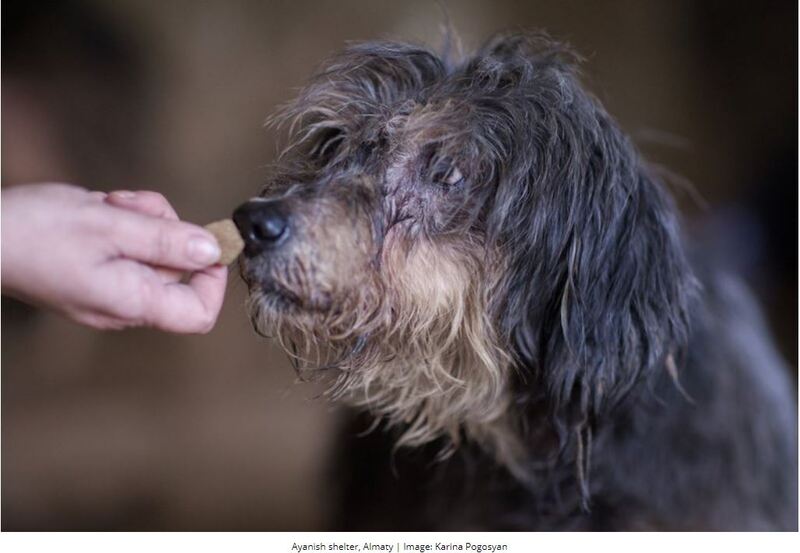 2021-03-10
2021-03-10Pandemic downturn leads to animal abuse crisis in Kazakhstan
Kazakhstan is facing a multitude of problems, including a weak currency, dependence on fluctuating oil prices, a closed political system and dire human rights. Amid all of this, the fate of its abused pets may seem trivial. However, passionate activists are rising up to take a stand for animal rights. As the Central Asian state’s socio-economic conditions have worsened over the past year due to the pandemic, more pet owners have been abandoning their animals or committing violence against them. And just as animal shelters are more needed than ever, they’re grappling with an influx of animals, a lack of funding and a legislative vacuum on animal rights. -
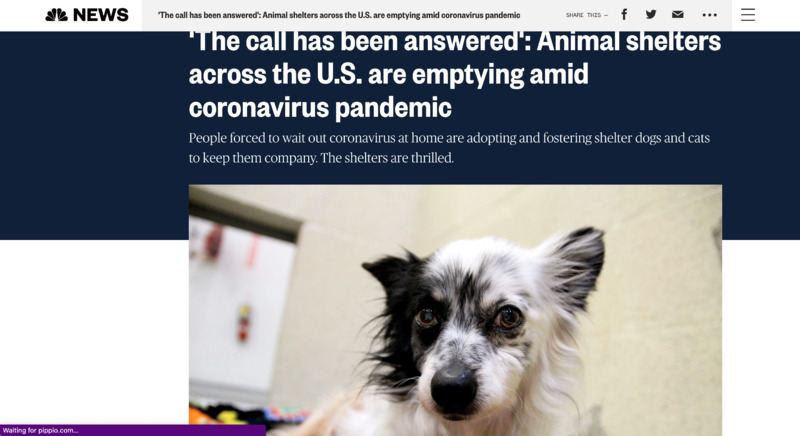 2020-04-19
2020-04-19The call has been answered
The article discusses the surge of pet adoptions from shelters during the pandemic. -
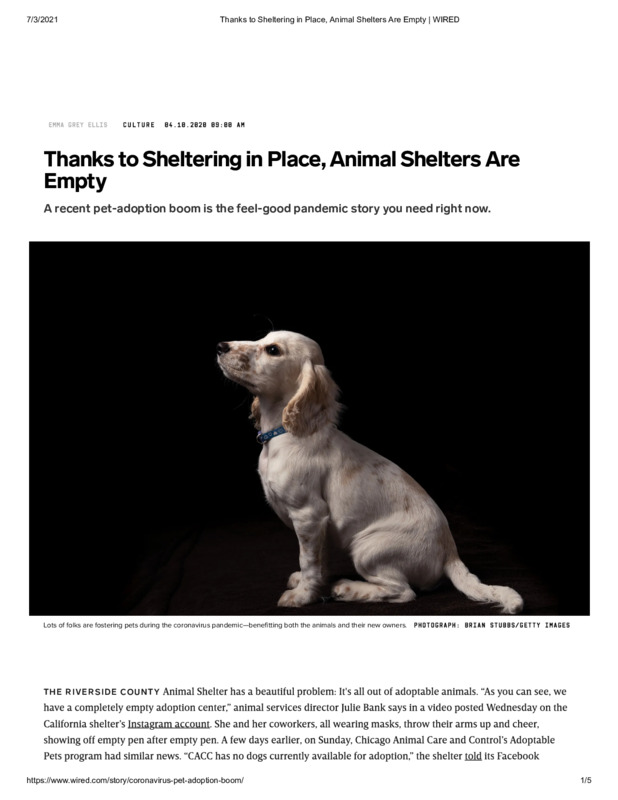 2020-04-10
2020-04-10Thanks to Sheltering in Place, Animal Shelters Are Empty
This article discusses the animal adoption trend in the United States during the pandemic. Some shelters find themselves completely empty, which is a dream come true for animal lovers. On the flip side, there are families in crisis, particularly in large cities, that have been forced to give up their pets. Fortunately, with so many foster and adoptive families on waiting lists, these pets won't be going to shelters for any length of time. -
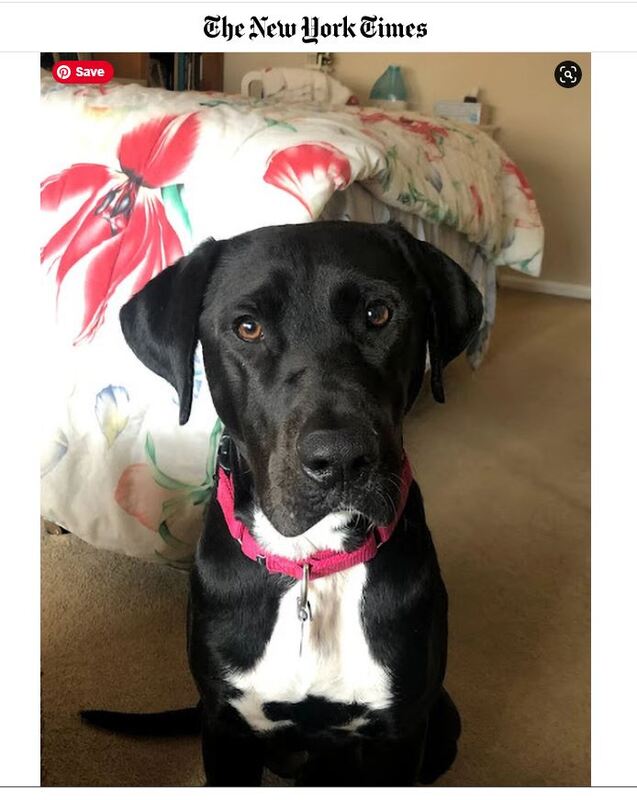 2021-05-31
2021-05-31No, People Are Not Returning Pandemic Dogs in Droves
This article explains that we should not be alarmed by the headlines that state that pandemic pets are returning to shelters as their owners return to work. The numbers just don't support that supposition. While abandonment rates are on the rise, they appear to simply be returning to pre-covid rates. -
 2021-05-08
2021-05-08US dog shelters struggle with returns after pandemic adoption boom - BBC News
This story from the BBC talks about how many dogs adopted during the pandemic are being returned to shelters once life returns to normal. Some adopters did not think ahead or understand all the implications of pet ownership. This is a traumatic experience for these poor animals. Also fewer dogs were neutered/spayed during the pandemic, so there is an uptick in the number of puppies needing homes. -
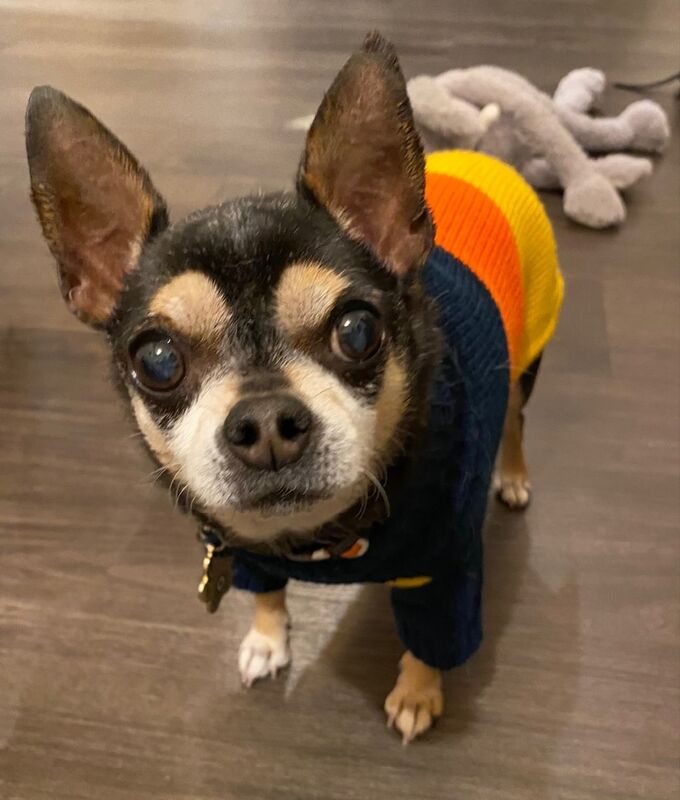 2021-01-26
2021-01-26Running Out of Adoptable Pets
During the pandemic, shelters are having the best problem possible- there aren't enough homeless animals to meet the demand. It is a dream come true scenario for animal lovers everywhere. With more people working from home than ever before, families have more time to devote to a pet. Hopefully the trend will continue, and owners will not surrender their animals after life returns to normal. -
 05/03/2021
05/03/2021Jeff Foster Oral History, 2021/05/03
Elizabeth Hathorn interviews Jeff Foster, a college student and member of the U.S. Army. He discusses the effects of COVDI-19 on college classes and on military training. He also touches on a few other aspects of life during the COVID-19 quarantine. -
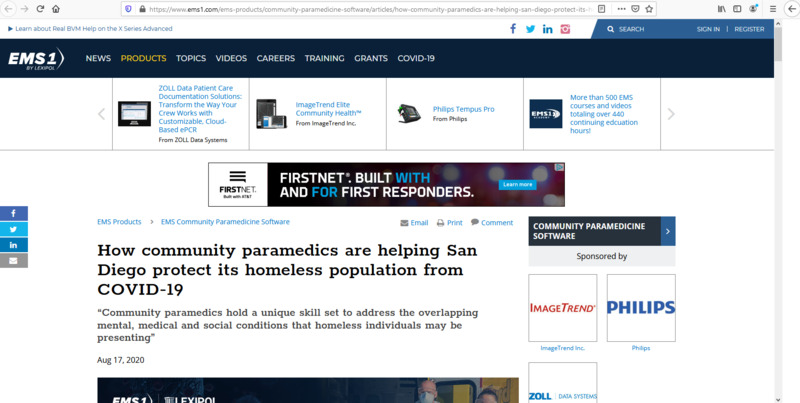 2020-08-17
2020-08-17Community Paramedics Help Protect Homeless Populations from Covid
This article discusses the use of community paramedics in the Covid-19 prevention efforts for San Diego's homeless population. Community paramedics are specifically trained paramedics that shift their focus from the treatment/transport to the hospital model, to a home-care model where the patient receives treatment and stays at home. In this case, they are being used to staff clinics at homeless shelters to provide care and Covid testing to their homeless population. The article references a 2017 hepatitis A outbreak in their homeless population and how that event has influenced the efforts during Covid to prevent a major homeless population Covid-19 outbreak. The article also explains the complexities of running these clinics but that it is worthwhile to aid a community that is among the most vulnerable to Covid. -
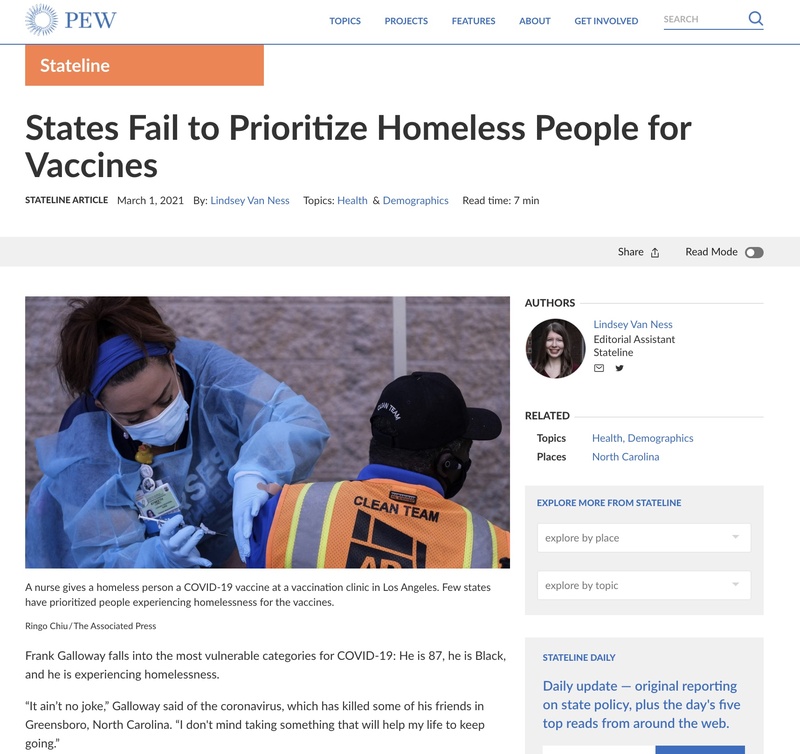 2021-03-01
2021-03-01Homeless Vaccines
This is a blog post about the current struggles states are having with getting homeless populations vaccinated. The article focuses on how shelters are the most common points of contacts for homeless populations to be reached. -
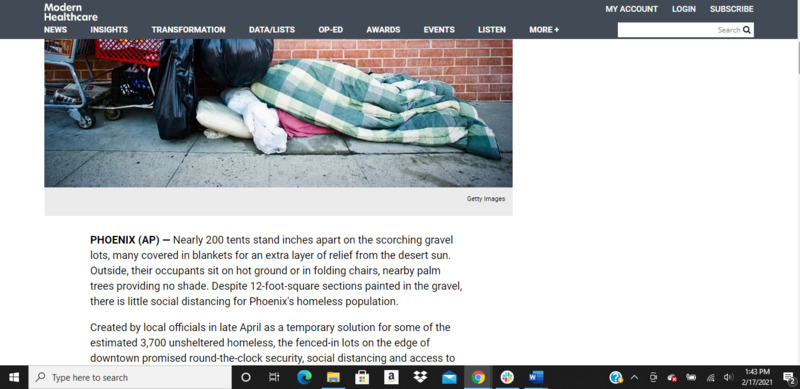 2021-02-07
2021-02-07Homelessness During a Pandemic
A population that gets put last for many things is not going to be completely last for the COVID vaccine. Each individual US state is in charge of the vaccine distribution, but some states, like Connecticut for example, have homeless shelters and similar places under the “congregate settings” part of the vaccine rollout, typically in the first few phases. The homeless population is far too high in the US, and during the COVID pandemic, not much more than the bare minimum has been done. The CDC and many other health organizations have the homeless and other vulnerable populations written into the big picture, with guides and recourses for cities and governments. However, these vulnerable populations are high risk during this pandemic. Food banks have seen a major rise in 2020 as more people are facing economic hardships. Attached are a few related articles. While there are some people working tirelessly to improve the homeless situation in the US, more needs to be done. The articles give a glimpse into the various aspects of the homeless crisis in America, and how we are trying to help during the pandemic, but simultaneously not doing enough. -
 2020-11-15
2020-11-15COVID 19 - PETS
Pictured in the photo is my 2 year-old mut, Nala. Like many dogs during the pandemic of COVID-19, she was happy. The governor of Massachusetts issued a stay-at-home order that forced many businesses to begin operating online, employees to work remotely, and students to be taught through a screen. This left residents with not much to do as facilities closed to stop the spread of the virus, and so, people turned to the shelters and pet adoption. It seemed like the perfect time to welcome a new family member into the household-- people were able to spend more time taking care of puppies who might have needed extra training or surveillance at home. Shelters all across America were being flooded with adoption applications during the pandemic, and other shelters even ran out of dogs to adopt. Nala’s smiling face in the photo represents the simplicity of the happiness one can get from spending more time with family. It was a silver lining during these uncertain times. -
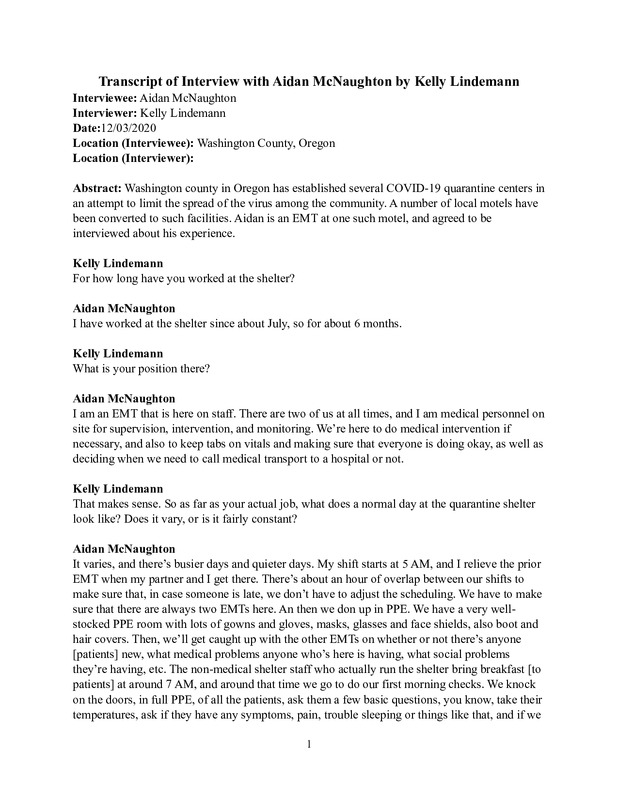 12/03/2020
12/03/2020Aidan McNaughton Oral History, 2020/12/03
Washington county in Oregon has established several COVID-19 quarantine centers in an attempt to limit the spread of the virus among the community. A number of local motels have been converted to such facilities. Aidan is an EMT at one such motel, and agreed to be interviewed about his experience. -
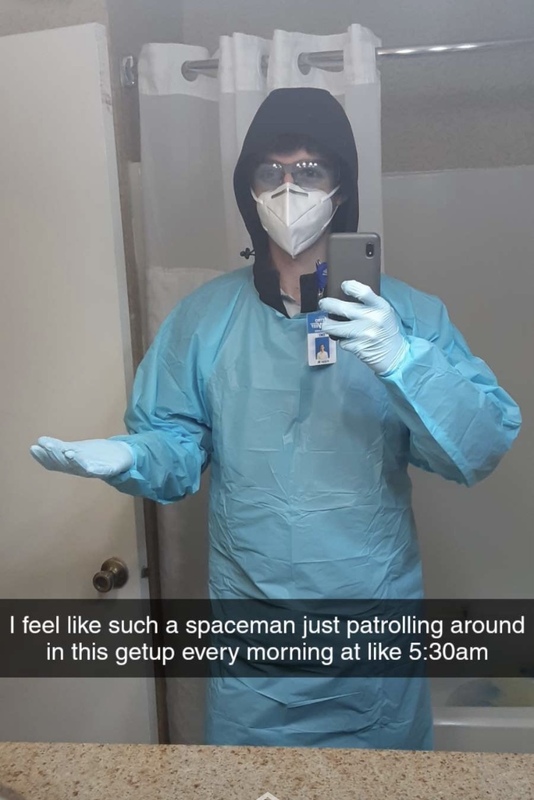 2020-10-23
2020-10-23Voluntary Isolation Motel EMT
Several counties across Oregon have coordinated with local motels to establish voluntary isolation shelters in an attempt to curb the spread of COVID-19. Each location is staffed with city personnel to manage admittance and discharge, while EMTs on staff conduct routine medical monitoring to patients. My boyfriend works in one of these shelters, and sent me this picture of him in his full PPE getup before making morning rounds. The shelter's capacity varies a lot week by week, and anywhere from 1-20 COVID positive patients may be staying there at any given point. This particular motel intakes prisoners who need to do a 2 week quarantine before being released, but also serves non-incarcerated people who have tested positive. -
 2020-10
2020-10Jewish Melbourne: Jewish Museum of Australia's 'Sukkah'
"While we won’t open our doors until January – and set hearts aflame with MIRKA from Valentine’s Day – we’re delighted to reunite with you at Sukkah. A collaboration with Zahava Elenberg, Creator of Clikclax, Director of Move-in and Co-Founder of Elenberg Fraser Architecture, Sukkah invites you to reflect on humanity and what it means to be in a community. Crafted from Polycarbonate in translucent earth, sky and desert colours, it provides shelter and encourages us to look out towards the never-ending sky and beyond adversity. So until we can meet again at our Museum, we hope you enjoy Sukkah – and think, dream and feel together." -
 2020-10-15
2020-10-15Light at the End of the Tunnel
Just a couple weeks ago I adopted a nine week old mini australian shepherd puppy, named Ozzy, who is in the photograph. There were many factors that went into adopting my first ever puppy, and a lot of it had to do with the world pandemic: coronavirus. All summer while everyone was staying inside their houses quarantined, I was out working at a breakfast restaurant. Of course, all employees wore masks, but not every customer that walked into the restaurant was aware of the severity of the pandemic. Some would refuse to wear masks, even though it was a state law, cough or sneeze in your face, while being ruthless and careless. Although the government is showing action by recommending everyone to wear masks, it is not necessarily helping the current state of our country. I believe that more action needs to be taken for the pandemic to be resolved or improved. This led me to leave my job, and spend more time at home to protect the safety of me and my family. Scrolling on the internet with all my free time I saw that a lot of dogs were in need of a home due to shelters and pet stores overflowing. This led me to find the most perfect puppy, and now he is a part of my family. Contrary to my beliefs there is always a bright side in unfortunate situations. Ozzy turned out to be the light at the end of the tunnel, providing me with the happiness I was missing in the past few months due to the declining state of the world. -
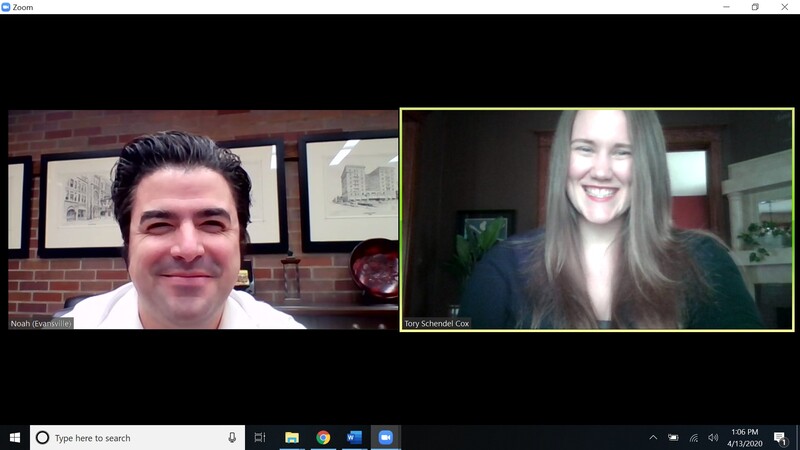 04/13/2020
04/13/2020Cultural Insights: Interviews in the Creative Sector #19 … Noah Stubbs, City of Evansville
In response to COVID-19, the Evansville Museum of Arts, History and Science launched the mini-series, "Cultural Insights: Interviews in the Creative Sector," to highlight colleagues and professionals working in the same or similar field of museum professionals. -
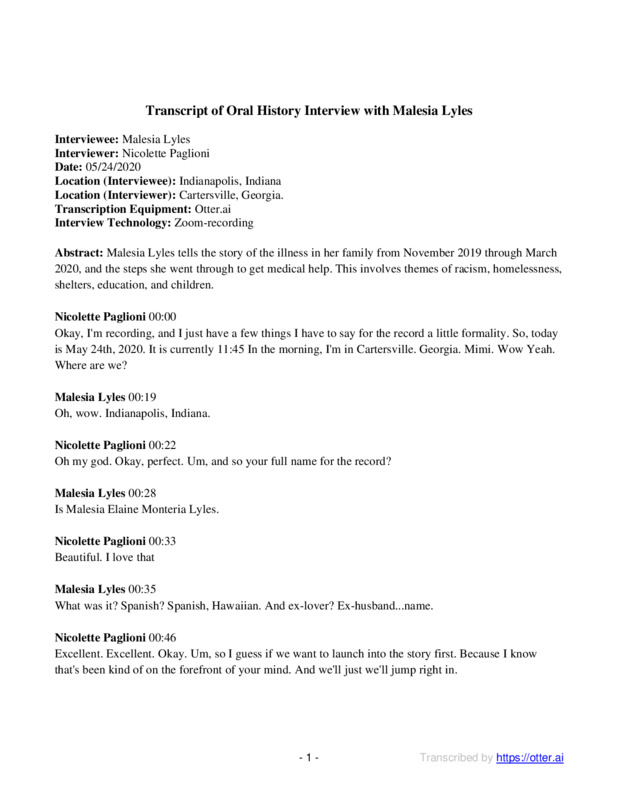 05/24/2020
05/24/2020Malesia Lyles Oral History, 2020/05/24
An incomplete interview with Malesia. Malesia Lyles tells the story of the illness in her family from November 2019 through March 2020, and the steps she went through to get medical help. This involves themes of racism, homelessness, shelters, education, and children. -
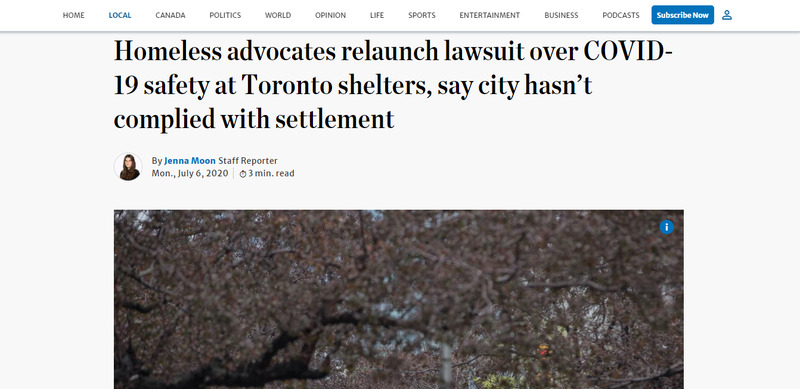 2020-07-06
2020-07-06Homeless advocates relaunch lawsuit over COVID-19 safety at Toronto shelters, say city hasn’t complied with settlement
"Toronto’s homeless advocates have relaunched a lawsuit against the city over unsafe shelter conditions. "In a notice of motion filed Friday, a coalition of public-interest groups alleges that the city has failed to follow a settlement agreement meant to ensure physical distancing standards within the shelter system. "The lawsuit, first launched earlier this year, alleges the city put people’s lives at risk amid the pandemic by not following public health distancing recommendations." -
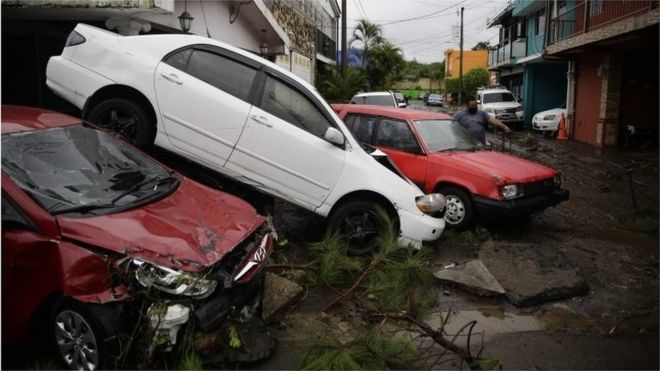 2020-06-01
2020-06-01El Salvador: COVID-19 & Tropical Storm Amanda
The photograph is one of many of the aftermath of Tropical Storm Amanda in Central America, specifically El Salvador. Due to COVID-19 pandemic, the country's president has enforced strict quarantine measures. The smallest country in Central America has recently been hit with a tropical storm resulting in many landslides and destruction of homes. Many have been displaced and are having a hard time finding food. -
 2020-05-24
2020-05-24Indigenous families given new lease on life as pandemic opens up housing options
This article relays an unexpected benefit to the pandemic. Because more people are staying put, putting off moving for work and school, among other reasons, there has been a downturn in the rental market. This has opened up better and more plentiful housing options for those struggling to find accommodations for large families when builders and landlords prefer smaller single or two bedroom units. Centres which aid women leaving abusive relationships and indigenous people (or both), such as the Wabano Centre for Aboriginal Health, are finding this a particular boon, allowing them to clear their waiting lists/backlogs and find housing for clients previously in limbo. -
 2020-05-21
2020-05-21The San Francisco Bay Area is putting homeless people with COVID-19 in hotel rooms. Some are given alcohol to prevent withdrawal.
This is a news article that details how San Francisco is managing their homeless population during the COVID-19 outbreak. Based on CDC recommendations, San Francisco secured hotel rooms to provide shelter to their homeless population. The project is called "Project Roomkey." Additionally, under a "harm reduction" strategy, the city is providing alcohol and access to purchase medical cannabis to prevent withdrawals for addicts who may otherwise leave the provide shelters to retrieve said substances. The article highlights similar measures across the Bay Area. -
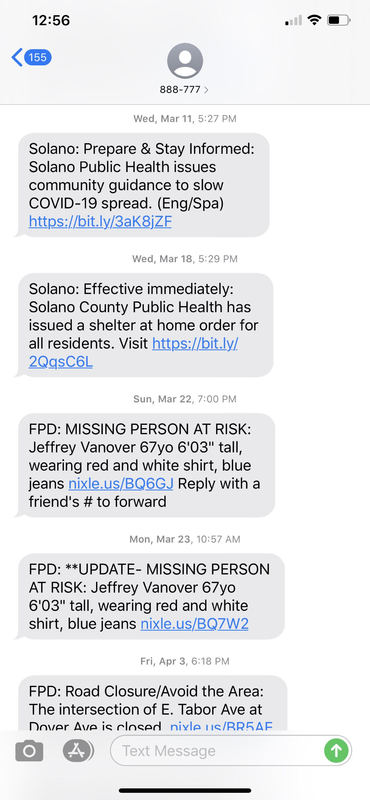 2020-03-18
2020-03-18Shelter in place county warning
The county texted an announcement on 03/18/2020: Solano: Effective immediately: Solano County Public Health has issued a shelter at home order for all residents. -
 04/05/2020
04/05/2020Life at home during the Coronavirus isolation. People are finding that they have a lot of time on their hands--especially at first. Then a "new normal" set in and people became busier.
During the beginning of the shelter at home order, people were trying to figure out what to do with their time. #homelife, #isolation, #shelterathome, #naps, #eating #ASU #HST580 -
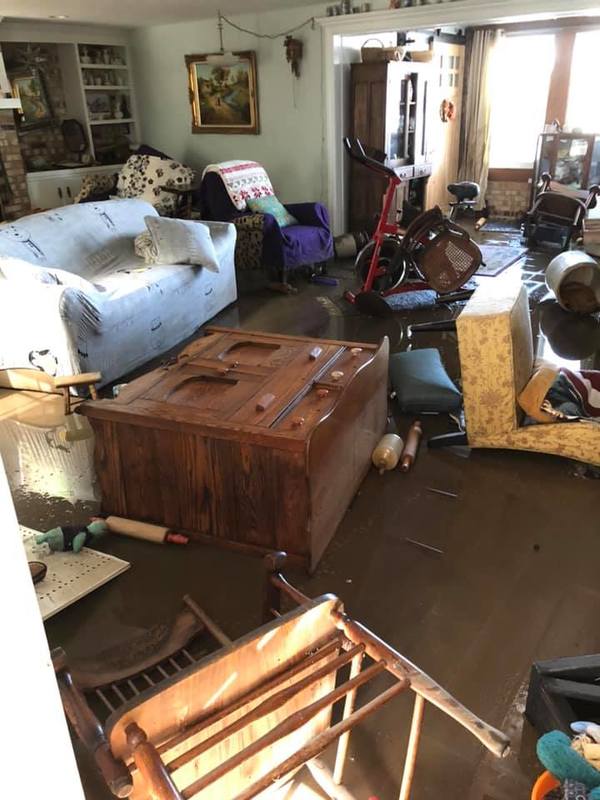 2020-05-20
2020-05-20Sanford Lake Flooded amidst COVID-19 Pandemic, 10,000 people evacuated.
I’m having a hard time putting into words what I feel. My mom lives on Sanford lake in the house that belonged to my grandparents. After excessive rain, the three dams that regulate the Tittabawassee River broke one by one. The lake level rose, and flooded homes and roads. The city of Midland also flooded. My mom, brother, and uncle evacuated. Initially, my mom went to the designated shelter- Meridian Highschool. But my brother called her and said it was a bad idea because it was upriver from her home, probably would flood too, and there’s COVID-19, so being packed in a highs school with a bunch of people isn’t the safest place to be. She ended up going to my brother’s in Midland, which was not part of the flood zone. This morning her house is completely flooded. -
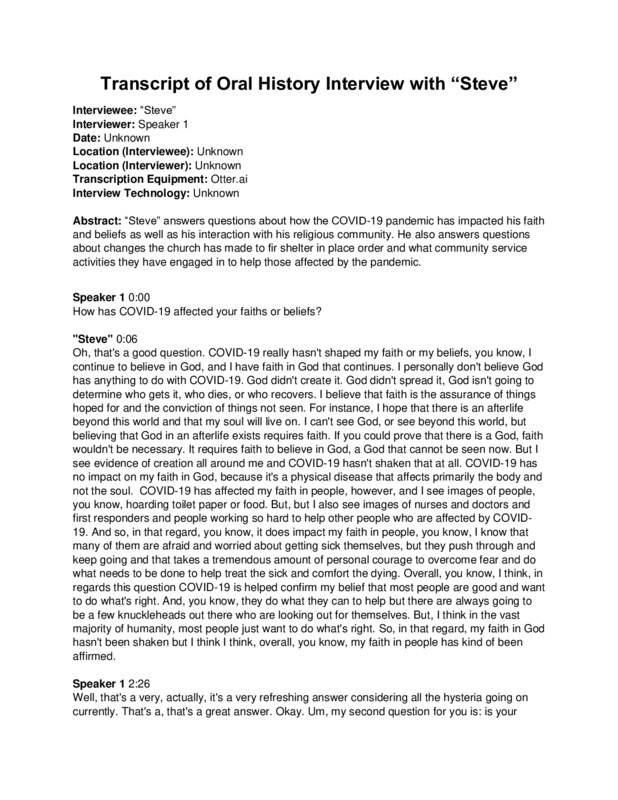 2018-04
2018-04“Covid-19 really hasn't shaped my faith or my beliefs."
“Covid-19 really hasn't shaped my faith or my beliefs. You know I continue to believe in God and I have faith in God that continues. I personally don't believe God has anything to do with covid-19. God didn't create it. God didn’t spread it. God isn’t going to determine who gets it, who dies or who recovers. I believe that faith is the assurance of things hoped for and the conviction of things not seen. For instance, I hope that there is an afterlife beyond this world and that my soul will live on.” -
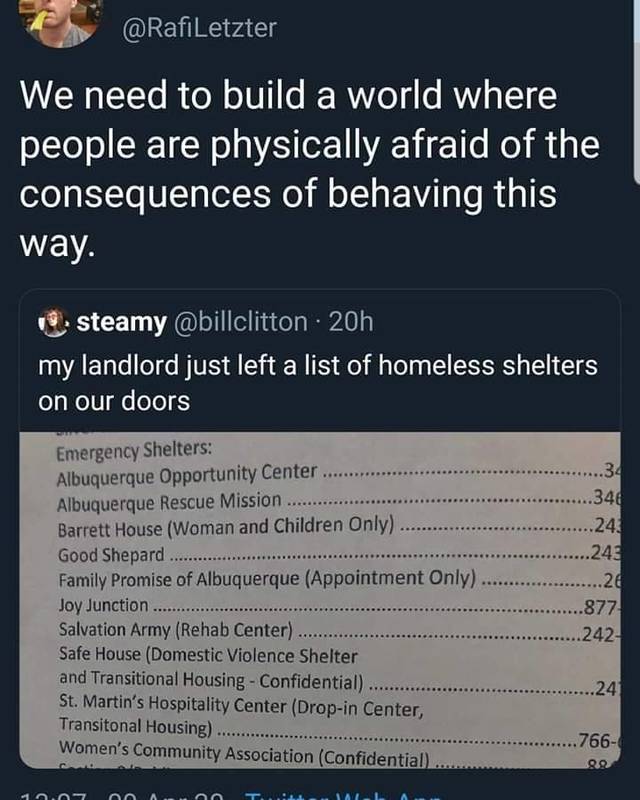 2020-04-01
2020-04-01Landlord left a list of homeless shelters
The tweet shows a picture of a list of homeless shelters the twitter users landlord displayed on their doors. This is due to financial issues for many. Many people were unable to pay rent due to being laid off for jobs. The person replying to the tweet expresses outrage that the landlord is not willing to make an exception since this is in the middle of the pandemic. -
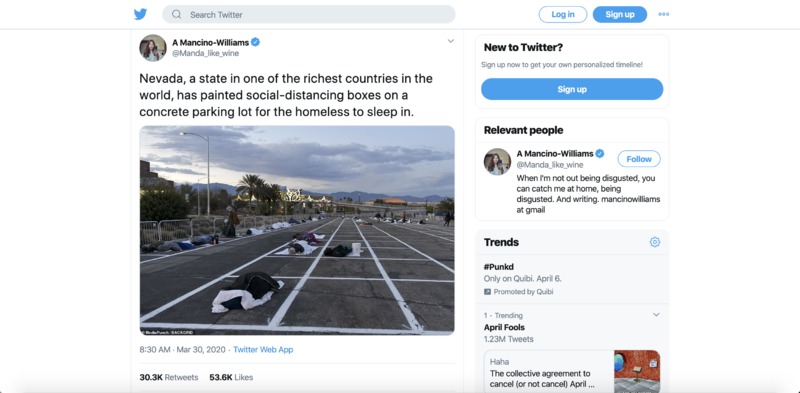 2020-03-30
2020-03-30Tweet re: treatment of Las Vegas Homeless During Pandemic
Tweet reacting to the news that with the closure of a major homeless shelter in the city, the Las Vegas, NV and Clark County governments had agreed to set up a makeshift shelter by drawing separate squares on an open-air parking lot. #HIST5241
